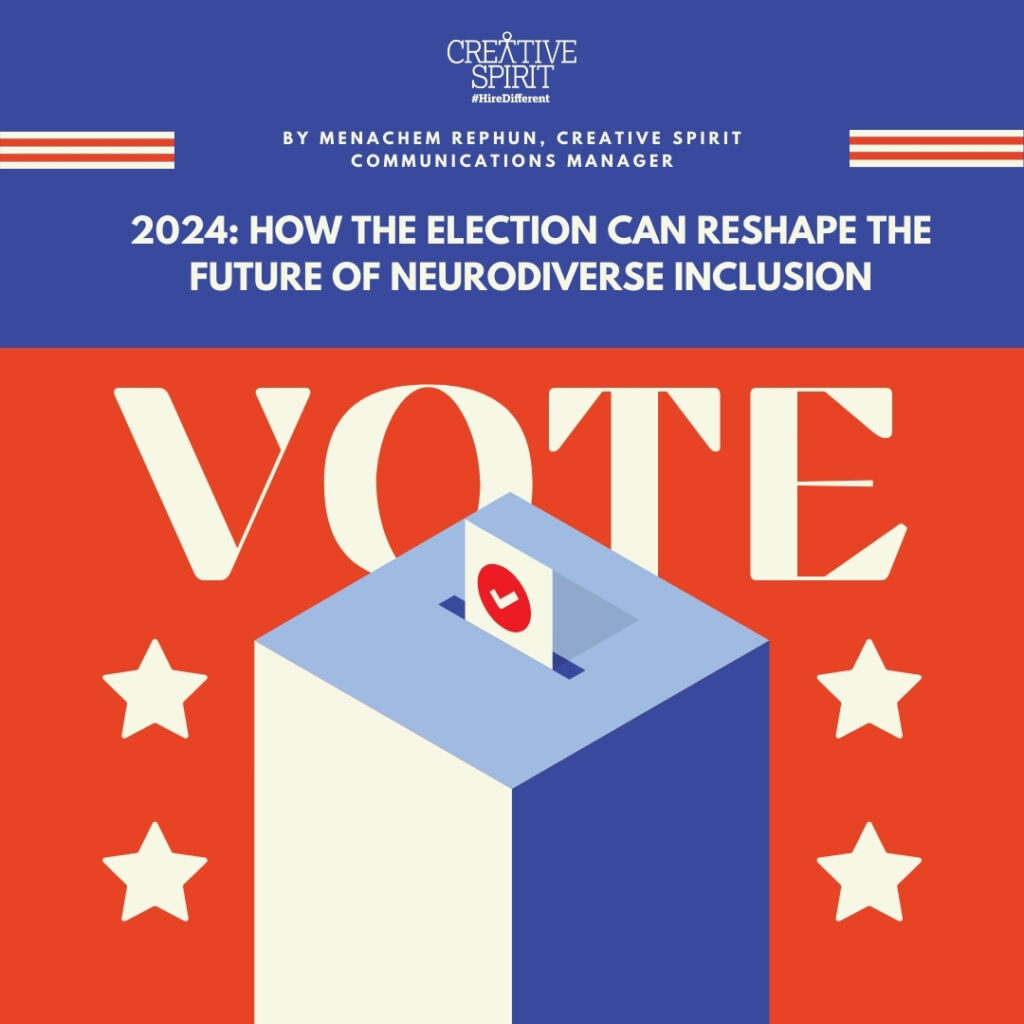Written by Menachem Rephun, Communications Manager and Advocate
Art by Chris Jarrin, Art Director and Advocate, and Joanna McElnea, Community Manager and Advocate

From voting rights, to abortion, gun control reform, and much more, the 2024 election will be momentous in shaping the future of American democracy. The upcoming election is also an opportunity for a renewed focus on supporting and upholding the basic civil rights of the approximately 42.5 million Americans with disabilities, including the 15-20% of the U.S. population estimated to be neurodivergent. Now more than ever, it’s crucial that voters with disabilities have both the voice and the visibility to create a full-fledged “disability policy agenda” to improve representation, accessibility, and inclusion.
In an essay for Forbes.com, contributor Andrew Pulrang acknowledges that while it might still be too early to determine exactly what that agenda will look like, “the sooner disability communities can come together over shared priorities, the better for efforts to leverage disabled people’s still unrealized political power.” Steve Lieberman, a disability rights advocate on the autism spectrum, points out that the disability community represents 25% of the U.S. population, yet “when it comes to advocacy, we don’t act like it. When are we going to wake up to our own power?” In 2024, voters with disabilities can exercise that power by advocating for substantial improvements to key issues like education, employment inclusion, voting rights, and affordable and accessible housing for people with disabilities, to name a few.
In his essay, Pulrang divides disability rights issues in 2024 into two categories: 1) long-standing issues that disability rights activists want to address and 2) extremely urgent issues people with disabilities are forced to address. In this article, we’ll explore issues in both categories, and how they can and should be spotlighted going into 2024.
Know Your Employment Opportunites
Ensuring fair-wage employment for people with disabilities is unquestionably one of the most vital issues on the agenda in 2024. Creative Spirit’s research shows that 85% of neurodiverse adults are unemployed. At the same time, a report from the Return on Disability Group found that while 90% of companies claim to prioritize diversity, equity, and inclusion (DEI), only 4% have made hiring people with disabilities part of that agenda. For almost seven years, Creative Spirit has advocated for reform in neurodiverse employment and has utilized all of our resources to make that change a reality. As important as those efforts are, a coalition of disability rights advocates (including both allies of the disabilities community and people with disabilities themselves), business leaders, legislators, and ordinary people passionate about inclusion is needed to make employment inclusion central to the 2024 election.
Although the election is still almost a year away, some early signs of neurodiverse inclusion are encouraging. Several candidates have made inclusion and representation of neurodiverse individuals, particularly those with autism spectrum disorder, central to their campaigns. According to Above and Beyond Therapy, one candidate has proposed a national program that would provide funding for early intervention services for children with autism, ensuring they receive support as early as possible. Another has advocated for increased funding for autism research, allowing breakthroughs in developing effective therapies and treatments. In addition to presidential candidates, there are political leaders on Capitol Hill dedicated to ensuring fair-wage employment for the neurodiverse community, working to promote employment inclusion and end unjust policies like 14c, which allows employers to legally pay workers with disabilities subminimum wage.
Congresswoman Cathy McMorris-Rodgers (WA-05) and Rep. Bobby Scott (D-VA) are both strong supporters of Creative Spirit who have been a driving force behind legislation like the Transformation to Competitive Integrated Employment Act (TCEA), which would provide states and employers with the resources needed to transition employees into competitive, fully integrated employment. 2024 presents an opportunity to expand Congressional awareness, as well as awareness among candidates for the nation’s highest office, about the importance of employment inclusion for the millions of Americans who are neurodiverse. Above all, we want political leaders appreciative of the fact that disability inclusion benefits everyone in both the long and short term, creating a more robust economy that draws on the innovation and diversity of talent that employees with disabilities and neurodiversity can contribute.
Know Your Voting Rights
Improving employment inclusion for people with disabilities depends not only on raising awareness among leaders, but creating a society where people with disabilities and neurodiversity can enter leadership roles themselves. We believe this should be one of the major disability rights issues heading into 2024. In his essay, Pulrang categorizes voting access as an “immediate battle” people with disabilities will likely have to fight. Members of the neurodiverse community, as well as individuals with physical disabilities, can and must have a seat at the table and a voice in the major issues that directly impact their lives and well-being. Substantially improving representation in leadership positions, as well as in state and local elections, is an essential component of achieving that goal.
2020 saw an expanded variety of voting methods for people with disabilities, which in turn led to an increase in voting rates. Unfortunately, as Pulrang points out, “intensely politicized and racialized efforts to restrict voting pathways have surged since then. These efforts threaten to make voting even harder for disabled people than before the pandemic.” To counter this, Pulrang emphasizes the necessity of defending voting mechanisms like drop boxes, mail-in voting, and early voting days, all of which are essential for making voting far more accessible for people with disabilities. In November, Human Rights Watch.org reported that at least 14 states have passed laws in 2023 that make voting more difficult, according to data from the Brennan Center for Justice. One example is Senate Bill 1 (SB1), a Texas law that narrows the right to vote by limiting voter assistance programs for senior citizens and people with disabilities, along with restricting absentee and mail-in voting. Conversely, Congressmembers like Terri Sewell (D-AL) have reintroduced positive legislation like the John Lewis Voting Rights Advancement Act, which features a “preclearance” provision that requires states and jurisdictions that have recently discriminated against voters to seek federal approval before changing election laws and maps.
One organization not only pushing back against voting restrictions, but actively empowering leaders with disabilities, is Disability Victory, a 501(c)(4) nonprofit that offers training, networking, and leadership development for people with disabilities working on campaigns or running for political office. Co-founded by Sarah Blahovec, a disability civic engagement expert who has been involved with numerous disability rights organizations and programs, and Neal Carter, a leader in field operations, campaign strategy, and candidate training, Disability Victory represents a model for supporting and representing people who are neurodivergent and/or have physical disabilities. The organization points out that people with disabilities “experience both inaccessibility and ableism in the political arena. We have a harder time accessing education, resources, and support networks that can empower us to run for office.” In 2024, improving that access is paramount. After all, people with disabilities represent the largest minority demographic in the U.S., according to statistics from the U.S. Department of Labor. A functioning democracy must include full voting rights and accessibility for all of its citizens, including the significant percentage with disabilities.
Know About An Immediate Policy Battle You Can Support: Protecting the Americans With Disabilities Act (ADA)
Few pieces of legislation have redefined basic civil liberties for people with disabilities more than the Americans With Disabilities Act (ADA). Signed into law on July 26, 1990, the ADA resulted from decades of disability rights activism, dramatically overhauling accessibility and inclusion for people with disabilities, and enhancing protection against unlawful discrimination in education, employment, and public transportation. Unfortunately, despite the protections of the ADA, workplace discrimination against people with disabilities persists today. In 2023, the U.S. Equal Employment Opportunity Commission (EEOC) reported that “in the last year, the agency’s investigations have uncovered disability discrimination against workers with hearing and visual disabilities in a wide variety of industries, workplaces, and jobs, including the retail industry, manufacturing, cargo handling, restaurant, fast food, staffing, non-profit, transportation and trucking, and the tech industry.” Countering this discrimination requires leaders committed to upholding the protections of the ADA.
Fortunately, the past several decades have seen society shift towards the community integration model of disability, rather than the institutional model. Nevertheless, this positive trend is fragile and should not be taken for granted. In 2023, the ADA was severely threatened by the Supreme Court case of Acheson Hotels LLC v. Laufer, As Pulrang points out, both Republican and Democratic political figures, such as Democratic NYC Mayor Eric Adams and GOP Presidential candidate Vivek Ramaswamy, have advocated for revived institutions and mandatory mental health treatments for people with disabilities. The 2024 election presents an opportunity to push back against this approach and, in Pulrang’s words, “remind candidates and voters of why we moved away from institutions and highly regulated services to begin with.” Protecting the ADA is especially critical due to its close intertwining with employment and education for people with disabilities. The voices of people with disabilities must be heard and elevated in political leadership to ensure that the ADA continues to be protected and enforced. 2024 has the potential to be a transformative year for people with disabilities – as long as the community joins together to stand up proudly and unequivocally in defense of its rights, making it clear that the pre-ADA era is definitively over.
PWD: Know About Long-Term Neurodiverse/Disabilities Inclusion in Education
Ensuring full inclusion of students with disabilities within the American public education system is paramount. However, in Pulrang’s view, it falls under the category of a long-term policy people that people with disabilities will want to fight for rather than an immediate battle. A 2022 report from the personalized learning platform Learnfully found that approximately 41% of children have a learning difference, 24% have a confirmed diagnosis, and 17% of parents suspect their child has a learning difference. Unfortunately, that inclusion has yet to be fully implemented. AAC&U.org reports that between 2019–2020, only 14% of public school students from ages three – twenty-one received special education services. To succeed in employment post-graduation, students with disabilities need access to programs that accommodate their needs, rather than being forced to adapt to curriculums not designed with them in mind. In his essay, Pulrang writes that “poor implementation, weak enforcement, and insufficient funding” are the primary culprits behind the exclusion of students with disabilities in the education system. He notes that presidential candidates in the upcoming election should commit, or at least be encouraged to commit, to providing full federal funding for Special Education services under the Individuals With Disabilities Education Act (IDEA).
Other disability rights advocates have also spoken out about the need to improve education inclusion for neurodiverse students. In June 2022, Anna Higgins, then a rising sophomore at Colorado State University, and Claire Robinson, then a rising high school senior in Seattle, Washington, addressed Congress about the need to support students with disabilities. “Roughly half of the neurodiverse student population struggles with anxiety and depression, contributing to the youth mental health crisis,” Higgins and Robinson wrote in an essay sharing their message and recapping their experience on Capitol Hill. “Learning lags and social isolation make neurodiverse students three times more likely to drop out of school than their peers. Additionally, preliminary studies have estimated that anywhere from one-third to two-thirds of incarcerated people in this country struggle with learning disabilities — the great majority of which are undiagnosed.” Like Pulrang, Higgins, and Robinson emphasized boosting funding for IDEA, along with passing the RISE Act, an amendment to the Higher Education Act of 1965 that would equip students with disabilities and their families with critical information needed to choose the right college and to succeed upon enrollment. Higgins and Robinson point out that in addition to its moral and ethical value, supporting education inclusion for students with disabilities is extremely beneficial from a business and political standpoint. As examples, they point to leaders like California Governor Gavin Newsom, New York City Mayor Eric Adams, and Tesla Motors CEO Elon Musk, all of whom are neurodivergent. Thirdly, Higgins and Robinson recommend that Congress increase funding for the National Center for Special Education Research (NCSER) from $60 million in 2022 to $70 million in 2023 through the upcoming round of annual appropriations. The NCSER is the leading body that researches whether teaching methodologies are effective for students with disabilities, and as such, it is extremely important for education inclusion.
In an essay for Medium, neurodiverse author Fergus Murray (writing under the pen name Ferrous) identifies several barriers to education for neurodiverse students, including bullying, inaccessible school work, and the rigid structure of most school environments. We can give kids that we know the vocabulary to talk about this stuff,” Murray writes, “and arm them with the ability to self-advocate. We can also take every opportunity to encourage professionals to listen to the voices of neurodivergent people — almost all of them want to do their jobs better, and not all of them have realized how much better they could do them if they took the time to learn from our life experiences.” The efforts of individuals like Murray, Higgins, and Robinson (who also identify as neurodivergent) represent the ideal of advocacy that should be taking place to make a difference for people with disabilities nationwide. Activism and advocacy on par with theirs can make a huge difference in shaping 2024 and beyond.
PWD: Know About Long-Term Improving Home Care and Benefits for People With Disabilities
Substantially improving healthcare access, child care, home and community based services, and support for care workers are important goals that people with disabilities will likely want to fight for in the long-term. At the same time, the upcoming election presents an opportunity to bring these concerns to the forefront. “At the very least, all candidates at the national and state level should at least be asked to address the need for home care,” Pulrang writes. “It is a fundamental issue for the elderly, people with disabilities, and caregiving families.” Pulrang notes that in 2021, the Biden Administration took steps to significantly boost funding for Home and Community Based Services for people with disabilities, which enable people with disabilities to live independently rather than in nursing homes or care facilities. The effort involved an initial proposal of $400 billion in federal funding as part of the administration’s American Jobs Plan, which was later reduced to $150 billion following negotiations with Congress. Pulrang points out that a second-term Biden Administration will have the opportunity to once again push for an increase for funding in home care, along with reducing or eliminating long waiting lists for people with disabilities.
Pulrang also recommends asking 2024 presidential candidates to support a reform plan that would allow people with disabilities to work without losing crucial support benefits. Another important step forward in 2024 would be removing marriage penalties, which prevent people with disabilities from being able to marry due to losing indispensable benefits. Pulrang cites Tina Pinedo, Communications Director of the Disability Rights Education & Defense Fund, as one of the individuals leading the charge to eliminate marriage penalties for the disabilities community.
PWD: Know About Revolutionary Changes Upcoming in 2024
Through sweeping reforms in education, employment, healthcare, and more, 2024 has the potential to be a truly transformative year for the millions of Americans with disabilities, including both neurodiverse and physical conditions. Of course, achieving this lasting change will require consistent, concerted advocacy from both the disabilities community and its allies and supporters. Political leaders, including legislators and candidates for high office (especially the Presidency), must appreciate that Americans with disabilities are not a fringe group but a major segment of the population and that full inclusion and equal rights for people with disabilities are essential, indispensable components of a fair and humane society. We at Creative Spirit will continue doing our part through our one-on-one candidate coaching, mentoring, corporate partnerships and DEI training programs, and job placement services designed to redefine neurodiverse employment. We’re also actively promoting disability rights legislation on Capitol Hill, such as bills designed to eliminate 14c, a provision allowing legal subminimum wage for employees with disabilities. We aim to help achieve a society where people with disabilities have full representation in education and employment, full voting accessibility, and equal opportunities to succeed. In 2024, it’s time for all of us to collectively say “no” to business as usual and to the status quo that still marginalizes people with disabilities as a minority demographic unworthy of serious attention. Let’s make 2024 a year in which the phrase “with liberty and justice for all” fully includes all Americans with disabilities.



